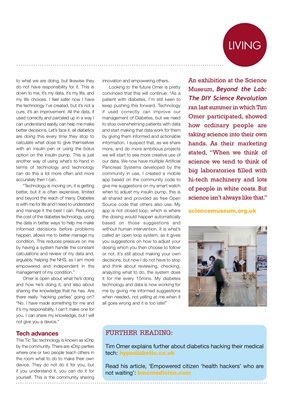
KITLIVING
to what we are doing, but likewise they
do not have responsibility for it. This is
down to me, it's my data, it's my life, and
my life choices. I feel safer now I have
the technology I've created, but it's not a
cure, it's an improvement. All the data, if
used correctly and parceled up in a way I
can understand easily, can help me make
better decisions. Let's face it, all diabetics
are doing this every time they stop to
calculate what dose to give themselves
with an insulin pen or using the bolus
option on the insulin pump. This is just
another way of using what's to hand in
terms of technology and technology
can do this a lot more often and more
accurately then I can.
"Technology is moving on, it is getting
better, but it is often expensive, limited
and beyond the reach of many. Diabetes
is with me for life and I need to understand
and manage it the best I can. Reducing
the cost of the diabetes technology, using
the data in better ways to help me make
informed decisions before problems
happen, allows me to better manage my
condition. This reduces pressure on me
by having a system handle the constant
calculations and review of my data and,
arguably, helping the NHS, as I am more
empowered and independent in the
management of my condition."
Omer is open about what he's doing
and how he's doing it, and also about
sharing the knowledge that he has. Are
there really 'hacking parties' going on?
"No. I have made something for me and
it's my responsibility. I can't make one for
you. I can share my knowledge, but I will
not give you a device."
Tech advances
This Tic Tac technology is known as xDrip
by the community. There are xDrip parties
where one or two people teach others in
the room what to do to make their own
device. They do not do it for you, but
if you understand it, you can do it for
yourself. This is the community sharing
FURTHER READING:
Tim Omer explains further about diabetics hacking their medical
tech: hypodiabetic.co.uk
Read his article, 'Empowered citizen 'health hackers' who are
not waiting': bmcmedicine.com
An exhibition at the Science
Museum, Beyond the Lab:
The DIY Science Revolution
ran last summer in which Tim
Omer participated, showed
how ordinary people are
taking science into their own
hands. As their marketing
stated, "When we think of
science we tend to think of
big laboratories filled with
hi-tech machinery and lots
of people in white coats. But
science isn't always like that."
sciencemuseum.org.uk
innovation and empowering others.
Looking to the future Omer is pretty
convinced that this will continue: "As a
patient with diabetes, I'm still keen to
keep pushing this forward. Technology
if used correctly can improve our
management of Diabetes, but we need
to stop overwhelming patients with data
and start making that data work for them
by giving them informed and actionable
information. I suspect that, as we share
more, and do more ambitious projects
we will start to see more creative use of
our data. We now have multiple Artificial
Pancreas Systems developed by the
community in use, I created a mobile
app based on the community code to
give me suggestions on my smart watch
when to adjust my insulin pump, this is
all shared and provided as free Open
Source code that others also use. My
app is not closed loop, which is where
the dosing would happen automatically
based on those suggestions and
without human intervention. It is what's
called an open loop system, as it gives
you suggestions on how to adjust your
dosing which you then choose to follow
or not. It's still about making your own
decisions, but now I do not have to stop
and think about reviewing, checking,
analyzing what to do, the system does
it for me every 15mins. My diabetes
technology and data is now working for
me by giving me informed suggestions
when needed, not yelling at me when it
all goes wrong and it is too late!"